-

-

In a development that pleased India and perplexed Pakistan, the People’s Republic of China finally lifted ‘hold’ on the request made by the US, the UK and France on a revised resolution to include Masood Azhar in the Terror List before the United Nations Security Council ISIL (Da’esh) and Al-Qaida Sanctions Committee (hereafter referred to as UNSC Resolution 1267) on May 1, 2019.
-
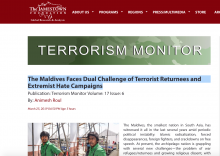
The Maldives, the smallest nation in South Asia, has witnessed it all in the last several years amid periodic political instability: Islamic radicalization, forced disappearances, foreign fighters, and crackdowns on free speech. At present, the archipelago nation is grappling with several new challenges—the problem of war refugees/returnees and growing religious dissent, with increasing amounts of hate campaigns on social media.
-
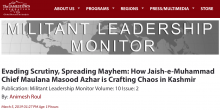
Maulana Masood Azhar, the founding leader of Jaish-e-Muhammad (Army of Muhammad—JeM), a Pakistan-based terrorist group blamed for violence against India over the past two decades—including the latest vehicle-borne improvised explosive device (VBIED) attack in Jammu and Kashmir (J&K) targeting a security convoy.
-
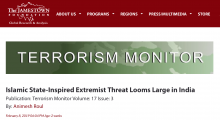
Despite massive territorial losses and military setbacks in the Middle East, the violent ideals espoused by Islamic State (IS) remain resilient and seem to be resonating in the hearts and minds of a section of inspired Indian Muslims. After a brief lull in IS-inspired or directed events in the country, Indian security agencies have unearthed multiple covert pro-IS networks, foiling conspiracies to carry out terrorist attacks targeting vital and sensitive installations and sites in and around the national capital, New Delhi, and places in Uttar Pradesh and Maharashtra States.
-
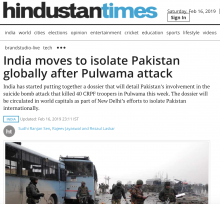
India moves to isolate Pakistan globally after Pulwama attack
India has started putting together a dossier on Saturday that will detail Pakistan’s involvement in the suicide bomb attack that killed 40 Central Reserve Police Force (CRPF) troopers in Jammu and Kashmir’s Pulwama this week. The dossier will be circulated in world capitals as part of New Delhi’s efforts to isolate Pakistan internationally, according to senior government officials who did not want to be named.
-
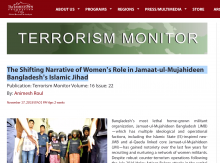
Bangladesh’s most lethal home-grown militant organization, Jamaat-ul-Mujahideen Bangladesh (JMB)—which has multiple ideological and operational factions, including the Islamic State (IS)-inspired neo-JMB and al-Qaeda linked core Jamaat-ul-Mujahideen (JM)—has gained notoriety over the last few years for recruiting and nurturing a network of women militants. Despite robust counter-terrorism operations following the July 2016 Holey Artisan Bakery attacks in the capital Dhaka, an alarming number of women are taking up the cause of militancy.
-
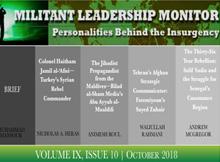
The Maldivian government has engaged in an effort to restrain radicalized youths from joining jihadists groups in Syria and Iraq. Despite these efforts, the total number of Maldivians fighting in the Syrian civil war has reached 61. According to the island nation’s National Counter Terrorism Center (NCTC), over 68 people have been intercepted and captured on their way to Syria and Iraq (Raajje News, January 15).
-

HAL appears to be sandwiched between politics of designers, end-users, decision-makers, media, and reality distortion attempts by large arms merchants.
-

Military acquisitions often go beyond political regimes. The procurement process for the new 110 MMRCA can only be adjusted after the next regime comes to power. Any large military procurement is approved by the CCS, presided over by the PM, with the MoD as implementing machinery. The mess created over MMRCA is, therefore, attributable to the state and its bureaucracy in the first place
Paxton ported to drupal by DropThemes.in